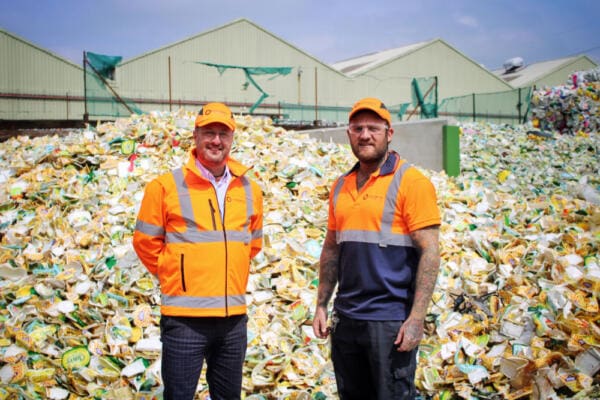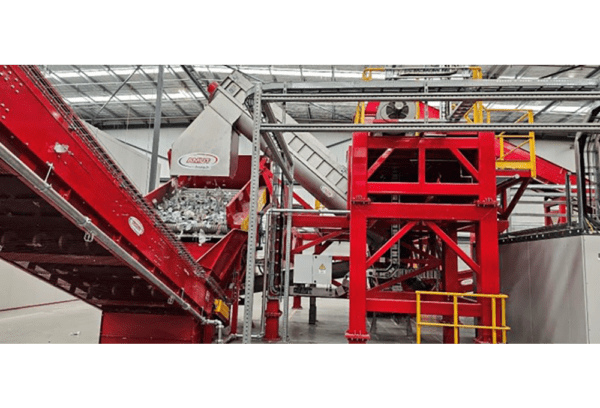
Plastic Reprocessing Firms Call on Government to Urgently Review the PRN System
Yorkshire-based Bright Green Plastics has joined forces with other plastic reprocessing firms and industry insiders to call on the government to overhaul the outdated PRN compliance system as a matter of urgency and has spoken with MP Alec Shelbrooke about raising the issue in parliament.
Many plastic reprocessing businesses believe the current PRN (packaging recovery note) and PERN (packaging export recovery note) system will if left unchecked, jeopardise the future of the recycling industry, make a mockery of the upcoming plastic tax, and potentially have a lasting impact on both the environment and jobs.
In another blow to the plastic reprocessing industry, due to lockdown, the price of crude oil has dropped in recent months, drastically bringing down the price of virgin plastic. This, in itself, is an environmental problem. While businesses and consumers are being encouraged to recycle more, manufacturers are choosing to purchase virgin plastic over more expensive recycled plastics.
Marcus Brew, Managing Director, UNTHA UK, says: “The falling price of virgin plastic product has of course impacted on demand for recycled plastics, and many operators are now worried about the commercial viability of their organisations. There will, of course, be repercussions throughout the supply chain, for as long as the price of this commodity remains low. However, while a degree of caution is understandable – and indeed wise – we need to look at the bigger picture.”
The basic rules of economics would suggest that a fall in the oil prices would see a drop in plastic material prices across the entire industry, making for a level playing field, particularly as the price of PRNs have recently dropped. However, the outdated compliance system, which came into force back in 1997, is causing the industry major problems largely due to loopholes in the system being abused along with the issue of the distorted ‘recycling’ data it produces.
Steve Spencer, Managing Director at Bright Green Plastics, explains: “The PRN price has dropped because monthly packaging data suggests recycling targets are being hit, but this data is highly questionable. Due to the pandemic, UK reprocessors have been operating at a reduced capacity in recent months, and with suppliers and customers on lockdown, levels of material for export and reprocessing have been massively reduced – yet the data says that PRNs have been produced at a higher rate than this time last year. How is this possible?
“Contrary to popular belief, just because there has been a recent reduction in the PRN price, this doesn’t mean the cost of recyclable plastic has immediately dropped. For starters, the industry doesn’t believe the data – we all know the PRN system is flawed, and the so-called targets are simply a box-ticking exercise.”
Bernard Chase, plastics recycling sector specialist, elaborates on the government’s recycling targets: “The Producer Responsibility Regulations have, for over 20 years, delivered the targets set by the government for the weight of packaging waste collected. They are called ‘recycling targets’, but in actual fact, they are simply ‘collection’ targets. These targets have been delivered through an explosion of waste packaging export companies with annual profits supercharged by the PERN subsidy.
“Exporters vastly outnumber UK reprocessors on the EA’s list of companies accredited to issue evidence of ‘recycling’. What is actually collected, how contaminated it is, where in the world it is sent, how it is recycled and by whom, how the energy is generated, how the water is managed, what happens to contaminated waste and by-products from the recycling process and whether any of it is actually reprocessed at all is not checked. Still, it appears that none of this actually matters, so long as the targets are met.”
Recovery notes are currently open to abuse and industry fraud from a minority of exporters and traders, leading to a distorted marketplace, with inflated prices of recycled stock. Subsequently, this has left the industry and the future of UK recycling at risk – which could leave the UK with no recyclers in place to provide materials once the plastic tax is introduced.
Chase adds: “The need to meet collection targets at any cost drives fraud into the whole system and those businesses that refuse to play the game lose out commercially. The system is therefore both corrupt and corrupting in the extreme, and there is no one, all the way up the chain to the government itself, who has any incentive to reform a system that on the face of it does what it says on the tin, which is to meet the targets”.
Bright Green Plastics’ Steve Spencer, who is driving the action for reform, has spoken personally with Alec Shelbrooke MP about raising the requirement for an urgent review of the PRN system and methods used to collate and report the data in parliament, on both environmental and economic grounds. What’s more, Shelbrooke has agreed to raise the issue of low virgin plastic prices with Rishi Sunak, encouraging the chancellor to place a tax on virgin plastics to stimulate the recycled market.
Susan Staff, Commercial Manager at Aylesbury Granulation Services, which processes a wide range of rigid plastics for use in future manufacturing, supports to drive for an urgent review: “The current pandemic, falling virgin plastic prices and distortions caused by the PERN system combined is making for a very challenging marketplace for our industry; the cost of raw waste is too high vs. the extremely low value of the finished product.
“It has long been my opinion that our fixation with packaging is too short-sighted. As a country, we should concentrate our efforts on keeping all good quality recyclable plastic in the UK and put pressure on manufacturers to use recycled material whenever and wherever possible.”
Marcus Brew, comments on the future of the plastic waste industry: “Businesses large and small, throughout the supply chain, need to keep pushing forward. They need to maintain their voice, work together to share knowledge and overcome obstacles, and remain focused on the long game as well as the ‘here and now’.
“The ‘waste’ industry is one renowned for innovation, and there have been outstanding examples of closed-loop thinking, for decades, not just in recent years. I hope – as the conversation surrounding the responsible use of plastics continues to grow – more and more companies will better embrace their CSR in this respect, whether willingly or under obligation. This will help the industry survive.”
Steve Spencer concludes: “Although many firms, such as ourselves, adhere fully to the compliance scheme, it is, unfortunately, open to exploitation. A government rework is long overdue in order to close the loopholes that are left open to fraud. Or better still, it should scrap the system and introduce an updated taxation system that’s fit for purpose and not open to manipulation.”
To further support the drive, Bright Green Plastics has generated a Change.org petition, calling on the Department for Environment, Food and Rural Affairs to consider significant changes to the PRN system to render it fit for purpose: http://chng.it/Kh6DqRSNjh,
To discover more about PRNs in plain language visit: https://brightgreenplastics.com/prns-explained-in-plain-language/.

Bright Green Plastics
01977 604080
Website
Email





